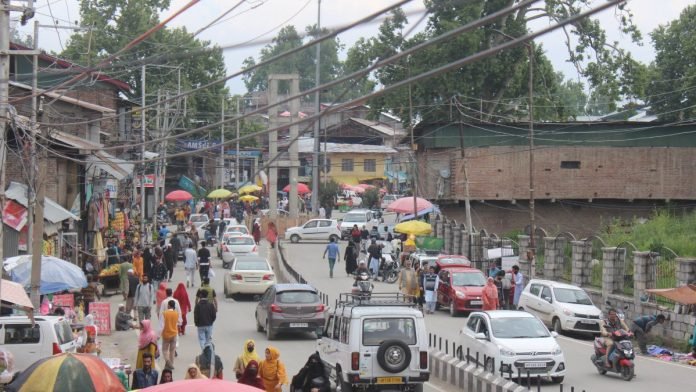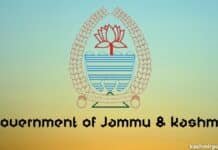
SRINAGAR — Jammu and Kashmir emerged as a top performer in the realm of e-governance, ranking first in the National e-Services Delivery Assessment (NeSDA) report, August 2024. According to the NeSDA Way Forward monthly report, released by the Department of Administrative Reforms and Public Grievances (DARPG), a total of 17,138 e-services are provided across all 28 States and 8 UTs of the nation and J&K provides a maximum number of 1164 services through a Single Unified Service Delivery Portal i.e, e-UNNAT.
This report is based on the inputs provided by States/UTs up to September 5, 2024.
e-Unnat is a single interface through which people of the Valley avail services as basic as applying for a driving license, birth or death certificate, domicile certificate and payment of income tax to special services such as availing farm machinery, e-auctioning of saffron, applying for artisan registration card. It also facilitates registering for any service under the tourism department, healthcare, tribal or women affairs.
NeSDA has set a benchmark for states to provide 56 mandatory e-services, with almost all states reaching this target by 2024. Notably, Jammu and Kashmir provides 54 services.
The NeSDA framework, being a comprehensive one, encompasses a wide spectrum of elements critical to effective e-governance service delivery. It assesses all the State/UT/Central Ministry Portals on four key parameters namely Accessibility, Content Availability, Ease of Use and Information Security & Privacy.
According to Mufti Hyder Ali, who has extensively worked with Jammu & Kashmir eGovernance Agency as a technical manager and core developer, the end goal of digital initiatives is to make the lives of common people easier. He says that due to the unavailability of information online, people had to struggle with basic services. But with more and more services transitioning into online mode, the accessibility of overall government services is improving.
“Offline delivery of services required people of all ages to physically attend the concerned office. This was not only tedious but challenging for elderly or specially-abled people and those who belonged to far reaches. Citizens often had to pursue their applications from one office to another. But with the transitioning of services into online mode, these shortcomings have been addressed,” believes Mr Mufti.
Mr Mufti adds that initiatives like UMANG and DigiLocker have redefined the experience of government service delivery in J&K. These services allow the citizens to directly avail the services and share documents without the need to upload them physically. “As per the IT Act, the documents stored in DigiLocker can be treated as equivalent to the original issued documents, which is a huge relief to our people,” he mentions.
Previously, Jammu and Kashmir also topped the NeSDA Way Forward Annual Report 2023 providing 1120 services.
In March 2023, J&K became the first in the country to introduce the auto appeal feature of the Public Services Guarantee Act (PSGA) for various online services. Under the auto appeal system, appeals get automatically moved to the appellate authorities in case the service is not provided within the period defined under the PSGA, thus leading to accountability and transparency.
As a result of digitalizing data and records, J&K’s “Darbar Move”, a unique practice involving the biannual shifting of the state government’s capital between Srinagar and Jammu due to the harsh climates was brought to an end in 2021.
This tradition dates back to the time of Maharaja Ranbir Singh who ruled the Valley in the 19th century. It included the movement of hundreds of trucks to transport official documents over a 300 km distance between Jammu and Srinagar at the onset of winter and vice versa.
In this regard, Mr Mufti mentions that by discontinuing the 149-year-old practice of Darbar Move, the government has been able to save all the expenses that it took to move the files, the cost of labour, travel allowance and to provide accommodation to employees. “Abolishing this practice has saved the government around Rs 400 crore,” he claims.
However, what made discontinuing “Darbar Move” possible was the transition of J&K administration from physical files and documents to e-office. In March 2021, the J&K Administration switched to e-office software, an electronic system that stores large amounts of data in a secure and structured manner protecting them from natural or man-made disasters. This major e-governance administrative reform in the UT enables an authorized employee to locate the required documents in the shortest possible time, resulting in increased efficiency in the functioning of employees.
While endorsing this step and calling it vital for e-governance, Mr Mufti adds that apart from financial benefits, e-office is a favourable step to contain corruption at all levels. “Previously, if an employee wanted to get a bribe from a person, he would easily dump a person’s file amid the chaos of Darbar Move and reveal it only after receiving bribery. However, such loss of documents or tampering in between transit is over now with digitization of records,” he informs.
While elaborating on the introduction of e-office in J&K governance, Mr Mufti says that the process was not straightforward but well-strategized and included multiple steps until dependency on physical documents was eliminated. “The primary milestone was to ensure the digitization of all existing files and the paperwork. For this, centralized scanning centres were set up in Civil Secretariats,” he states, adding that since its introduction, e-office has been an integral part of the entire government functioning with more than 300 offices onboard and disposal rate of files being reduced to three days.
“No secret tampering or overriding is possible with electronic documents. The files can be tracked easily and any delay in disposal of files can be spotted and the officials can be held accountable,” affirms Mr Mufti.
Mr Mufti, who reported to LG’s office, was a core team member in establishing the system and platform behind the working of the program ‘Awaam Ki Awaaz’, a monthly show headed by LG Manoj Sinha aired on All India Radio-JK and DD Kashir. He also developed the official websites of the Srinagar Development Authority, J&K Horticulture Produce Marketing & Processing Cooperation Ltd and designed the online portals including the J&K SHG Livelihoods Portal, Kashmiri Migrants Immovable Property Portal, Parvaaz Document Verification System, Social Welfare Event Monitoring System and many more.
While talking about the challenges in the digitization process and implementation of e-initiatives in Jammu and Kashmir, Mr Mufti admits that the major challenge remains the lack of technical expertise in the offices. He suggests that since Information Technology is an ever-evolving field and there are rapid developments ranging from AI to Blockchain, the government systems need to evolve.
“We must bring in industry experts and train our ground staff to the technical world to create top-notch services for the public. We must also educate citizens regarding cyber-hygiene and cyber attacks in order to move towards a safe digital world,” he concludes.
Follow Us
The Kashmir Pulse is now on Google News. Subscribe our Telegram channel and Follow our WhatsApp channel for timely news updates!









